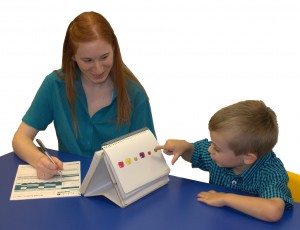
What happens in a language assessment?
A language assessment may be recommended if your child is having difficulties communicating, shows skills below the level expected for their age or is having difficulties with learning. Language skills may also be assessed if there are things in your child’s development or history which increase the chances of language difficulties such as hearing problems, prematurity, developmental delay or some disabilities.
Language assessment usually begins with gathering information from the parent about their concerns as well as information about the child’s medical and developmental history. Information from school is also useful and often the child’s teacher is asked to complete a questionnaire about the child’s abilities. Reports from any previous assessments that the child has had are also taken into account.
A number of activities are used to assess the child’s communication skills. This may involve use of formal tests or less formal play and book based activities or a combination of both depending on the child’s age and abilities. The speech pathologist will first watch your child and take into account information from the parent to choose the most useful assessment activities for each child. Parents are welcome and encouraged to be in the room for the assessment in most cases.
A language assessment covers a range of skills areas. Language skills are divided into two broad areas: receptive and expressive language. Receptive language refers to the child’s ability to understand the language that others use. This includes understanding words and sentences in order to learn new things, follow instructions and understand questions. Expressive language refers to the child’s ability to use words or other means to express needs, wants, opinions and ideas to others.
Assessment may include:
- the meaning aspects of language such as understanding words and concepts,
- the way words are put together to form sentences,
- use of grammar,
- forming longer pieces of language such as stories,
- how language is used such as in holding a conversation and solving problems,
- speech production or way the child uses sounds to form spoken words,
- written language skills including forming written words, sentences and stories,
- phonological awareness such as understanding sounds, syllables and rhyme, hearing sounds, using letters, breaking down words into separate sounds and blending sounds together to form words
This information allows the speech pathologist to pinpoint the child’s strengths and weaknesses. At the end of the assessment the results are discussed with the parents. The parents and other relevant people are then provided with a written summary of the assessment outcomes and activities and strategies to assist the child. A range of support options such as individual therapy and/or group programs may then be offered.
If you feel your child may benefit from a language assessment check Our website for more information. If you are not sure whether your child has the skills expected for their age find out more with our age specific checklists. We also have communication tips sheets for different ages.
For more ideas and resources for developing children's speech, language, learning and social skills check the resources section on our website and our extensive pintrest page. Like us on Facebook and follow us on Twitter so you don't miss out on what's happening.
Related Blog Posts
If you liked this post you may also like:
All about Language
Developing writing while on school holidays
Winter Play - Supporting Your Child's Development
Book Week, more than the costume!



